
The second part of Daniel Barenboim's Proms Ring cycle was less obviously derived from the Berlin performances he conducted in the spring of this year than the previous evening's Das Rheingold had been. Of the principal singers, only Ekaterina Gubanova as Fricka had also taken part in Die Walküre there, but the cast that had been brought together at the Albert Hall was very close to being as good as any that could be assembled from singers today.
But the great common denominator between the Berlin Staatsoper Ring and this one is the orchestra. Though Barenboim may perhaps have one or two peers as a Wagner conductor today, there's surely no other ensemble in the world that has this music more deeply ingrained in its collective psyche than the Berlin Staatskapelle. Even with some of the greatest Wagner singers of the present day onstage here, it was the orchestral playing that regularly demanded the attention, whether it was the effortless depth of tone in the strings, the sheer solidity and easy assertiveness of the brass, the perfectly defined pianissimos or the immaculate articulation of every solo detail. Even in a swelteringly sticky Albert Hall, not a note was out of place.
And however well one knows Daniel Barenboim's Wagner conducting from disc, its immediacy and fluency live are still overwhelming. Tempi seemed perfectly judged, neither over-excitable - even the closing moments of the first act of Walküre, which send some conductors into a frenzy, had poise and shape, nor over-deliberate – the Annunciation of Death in the second act, which can almost grind to a halt, was always moving forward. With Barenboim there is always the sense of the whole and not just of the passing moment, and it is a precious quality in Wagner.
Voices did occasionally disappear into the orchestra but that had more to do with the direction in which singers happened to be facing in Justin Way's semi-staging than anything else, and Bryn Terfel managed to get every whispered word of Wotan's second-act dialogue with Nina Stemme's Brünnhilde across just as consummately as he projected his more confrontational exchanges with Gubanova's steely Fricka, and every gently moulded phrase of his Farewell; Stemme was her usual unstintingly engaged self as Brünnhilde, not a psychologically complex character but an intensely likable one. Simon O'Neill's one-dimensional Siegmund was the only disappointment; his performance seemed lustreless alongside Anja Kampe's glorious, touching Sieglinde and Eric Halvarson's utterly secure and implacable Hunding, and especially against the background of such glorious orchestral playing and superbly shaped conducting.
* Available to listen again on iPlayer until 30 July

